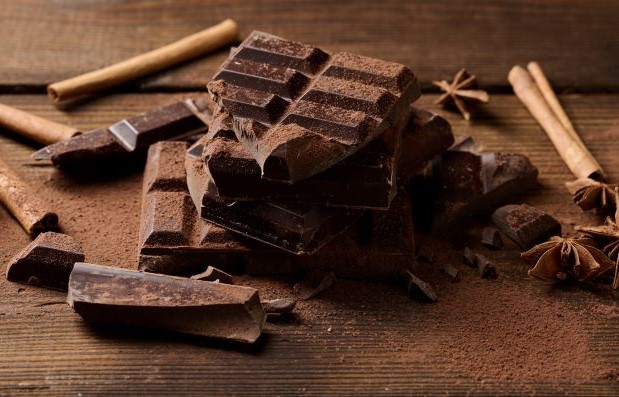Top 12 Health Benefits of Eating Dark Chocolate

Indulging in the rich, decadent flavour of dark chocolate satisfies your sweet cravings and brings myriad health benefits. The benefits of dark chocolate extend beyond mere enjoyment, offering a delicious way to boost your overall well-being. From improving heart health to enhancing brain function, dark chocolate's allure lies in its taste and potential to nourish both body and mind.
Explore the many benefits of dark chocolate as we delve into its remarkable contributions to a balanced diet and a healthier lifestyle.

Table of Contents

What is Dark Chocolate?
Dark chocolate is a form of chocolate that has a high level of cocoa solids, which ranges from 50% to 90%. It does not contain sugar and almost no milk, apart from milk chocolate. The high concentration of cocoa gives dark chocolate its rich taste and bitterness. It also offers various health benefits due to its high levels of antioxidants and essential nutrients.
Quality dark chocolate may have a more creamy texture than regular dark chocolates and a hint of fruit, nuts, or spices. Finally, this is an elitist food item for those who cherish its sophisticated taste profiles and health benefits.
Is Dark Chocolate Good for Health?
Yes, moderate consumption of dark chocolate is beneficial to our health. It contains antioxidants, which can protect against oxidative stress and inflammation. Additionally, dark chocolate may improve heart health by supporting healthy blood pressure and circulation.
12 Benefits of Eating Dark Chocolate Daily in Your Diet
Dark chocolates are obtained from cacao tree seeds and are packed with nutrients, which have several health benefits. For instance, the bitter taste of cacao beans is due to a high concentration of flavanol or flavan-3-ols, which have anti-inflammatory, antioxidant, and other excellent properties.
Here, we try to understand how dark chocolates positively affect our health by listing dark chocolate's top 10 health benefits.
1. Reduces Chances of Heart Disease
Eating dark chocolate regularly reduces the risk of coronary heart disease. It contains flavonoids that protect the heart by stopping LDL oxidation and lowering low-density lipoprotein. A study also found that those who consume dark chocolate more than twice a week have lower rates of calcified plaque in their arteries.
2. Increases Blood Flow and Reduces Blood Pressure
The bioactive compounds present in this dark treat, such as flavanol, can enhance circulation through polishing endothelium, which produces nitric oxide, as presented by researchers at universities such as Harvard Medical School, among others; moreover, it improves arterial elasticity substantially.
3. Lowering blood Sugar Levels
Polyphenols within dark chocolate work miracles, controlling and reducing factors leading to insulin resistance. Polyphenols in black chocolates manage insulin sensitivity and, therefore, help maintain glucose homeostasis.
4. Boosts Energy Levels
Dark chocolate is always a popular option among athletes because it contains theobromine and caffeine, stimulants that boost energy levels. It also has natural antioxidants and can be eaten as a pre-workout snack or a post-workout recovery food for motivational purposes and muscle repair.
5. Saves Skin from Dehydration
Consuming dark chocolate increases blood flow to the skin, thereby increasing skin hydration and density. It comprises proteins, minerals, and vitamins that enhance skin moisture. This makes cocoa an effective moisturiser for many brands in the beauty industry that use cocoa butter as one of their ingredients.
6. Aids Health in General
A person may also buy high-quality dark chocolates to improve his overall health naturally. Dark chocolate could also be used as an after-meal treat due to its adequate amount of manganese, magnesium, iron, selenium, copper, zinc and potassium.
7. Acts as an Anti-Inflammatory Substance
Dark chocolate can prevent chronic inflammation. This compound has anti-inflammatory properties that help inhibit chronic inflammation and other conditions such as diabetes and arthritis. Consuming 75-80% dark chocolate daily can improve gut microbiome health, leading to less inflammation in the stomach.
8. Improves Mental Performance
Dark chocolate is high in flavonoids that enhance memory recall, attention span, and cognitive abilities; hence, it prevents neurodegenerative disorders, including Parkinson’s disease and Alzheimer’s disease (AD). Researchers at Loma Linda University suggest that daily chocolate consumption can enhance intelligence.
9. It is a Reliever of Stress
Eating an average of 40 grams of chocolate daily will decrease cortisol (a stress hormone) and catecholamine (a fight-or-flight hormone). Thus, hypertension and anxious patients are recommended to eat dark chocolates containing 80-85% cocoa.
10. Pregnancy and Menstrual Cramp Aid
Dark chocolate’s magnesium and copper help relax abdominal muscles that cause menstrual cramps. Additionally, it can correct blood pressure in pregnant women and furnish them with essential nutrients. Incorporating 30 grams of dark chocolate in the diet during gestation helps maintain maternal health.
11. Better Eye Sight
High levels of flavonoids present in dark chocolate, which increase blood flow to the eyes, may enhance vision or improve overall visual clarity, aiding night vision and promoting general eye health.
12. Aids in Weight Control
Black chocolate can be used as a weight management supplement to prevent overeating and contribute to a balanced diet by satisfying food cravings, ensuring feelings of fullness, and supporting satiety moderation. It is also healthier than other sugary snacks.
Besides these benefits, there are numerous others derived from eating dark chocolate every day. However, it is important to note that Dark Chocolate has a high fat content and is hence very calorie-dense; therefore, it should be taken sparingly.
What is the Nutritional Content of Dark Chocolate?
Dark chocolate with a 70% or higher cacao content has beneficial compounds like flavonols, polyphenols, and theobromine. Furthermore, the health benefits of dark chocolate are directly proportional to the percentage of cacao content in dark chocolate.
According to the United States Department of Agriculture, the nutritional value of a 100 gm bar of dark chocolate consisting of 70-85% of cacao is as follows:
Nutrients |
Values |
| Energy | 598 Kcal |
| Water | 1.37 g |
| Carbohydrates | 45.9 g |
| Fat | 42.6 g |
| Fibre | 10.9 g |
| Ash | 2.32 g |
| Sucrose | 24 g |
| Calcium | 73 mg |
| Iron | 11.9 mg |
| Magnesium | 228 mg |
| Zinc | 3.31 mg |
How to Include Dark Chocolate in Your Daily Diet?

In most cases, nutritionists recommend dark chocolate for over 70% of its maximum health benefits. However, due to their unpleasant and bitter taste, most people find it challenging to consume dark chocolates as a whole.
Here is how to include dark chocolate in your diet:
Different Ways to Include Dark Chocolate in Your Diet

Dark chocolate can be a delicious and healthy addition to your diet when incorporated in various ways. Here are ten different ways to enjoy dark chocolate:
- As a Snack: Enjoy dark chocolate on its own as a snack. Its rich and intense flavour satisfies your sweet cravings while providing antioxidants.
- In Smoothies: Add a few pieces of dark chocolate or cocoa powder to your morning smoothie to boost flavour and nutrients.
- With Fruits: Pair dark chocolate with fruits like strawberries, bananas, or apples for a delightful, healthy treat.
- In Baking: Use dark chocolate in baking recipes such as cakes, brownies, or cookies for a more intense chocolate flavour.
- Melted as a Topping: Melt dark chocolate and drizzle it over desserts like ice cream or pancakes for a luxurious touch.
- In Trail Mix: Combine dark chocolate pieces with nuts, seeds, and dried fruits to create a nutritious and satisfying trail mix.
- In Hot Beverages: Add dark chocolate to your coffee, hot chocolate, or tea for a richer and more complex taste.
- As a Cooking Ingredient: Dark chocolate adds depth and richness to savoury dishes such as chilli or mole sauce.
- In Granola or Oatmeal: Mix dark chocolate chunks into your morning granola or oatmeal for a tasty and energy-boosting start to the day.
- In Yoghurt or Curd: Sprinkle dark chocolate shavings on top of your yoghurt or curd for a satisfying, nutrient-rich snack.
By trying these various ways to include dark chocolate in your diet, you can enjoy its unique taste and numerous health benefits while adding a touch of luxury to your meals.
What are the Side Effects of Overeating Dark Chocolate?
One should be careful not to eat a lot of dark chocolate, as it can lead to many side effects. It is important to watch how much of it one consumes so that their health does not deteriorate. Here are some possible negative effects of eating too much dark chocolate:
- Digestive Discomfort: Dark chocolate has high fibre content, and therefore, excessive intake may cause digestive discomforts like abdominal bloating, increased gas production, or even an upset stomach.
- Weight Gain: Dark chocolate is characterised by its high caloric value and fat content. If healthy diets and physical activity are ignored, gorging on it could result in weight gain.
- Caffeine Sensitivity: For those with caffeine sensitivity, symptoms such as restlessness, insomnia, or even rapid heartbeat can be triggered by the caffeinated contents in the dark chocolates.
- Tooth Decay: Despite having lower sugar levels than milk chocolates, excessive consumption of this product can still contribute to tooth decay and cavities.
- Acid Reflux: Eating large quantities of dark chocolate could cause acid reflux or heartburn because it relaxes the lower oesophageal sphincter.
- Blood Sugar Fluctuations: Even though its glycemic index is quite low compared to other sugary foodstuffs, excess intake would still bring about variations in blood glucose levels.
Incorporating dark chocolate into your diet in moderation will help you reap its benefits while avoiding these adverse effects. Consult a healthcare expert or nutritionist to establish the proper amount of dark chocolate for your specific dietary needs and health status.
Who Should Avoid Eating Dark Chocolate?
Besides, some people with specific health problems should avoid consuming dark chocolates. For example, if not controlled, excessive intake of dark chocolate may cause higher heart rates due to its higher caffeine content, and this may be associated with diarrhoea, anxiety, and even diabetes. Some people who have gluten intolerance and celiac disease also respond to chocolate at times.
Some of the risks that come with taking too much dark chocolate are:
It may increase the risk of kidney stones by raising urinary oxalate excretion.
The presence of tyramine—a natural chemical—in dark chocolate raises the chances of migraine headaches.
With high fat and caloric content, excessive consumption can result in cardiovascular diseases as well as obesity, according to Chua et al. (2015).
This means breastfeeding and expectant mothers should limit their consumption of dark chocolate because this can lead to caffeine intake that is harmful to their babies.
Dark chocolate may worsen symptoms for those with certain gastrointestinal conditions, such as irritable bowel syndrome (IBS) or acid reflux.
There are several proven facts and research about the health benefits of eating dark chocolate. However, neglecting the conscious portion while eating it might cause complexities in health. On the other hand, dark chocolate with 70% or higher cocoa components can be a healthy indulgence, keeping the rule of moderation in mind.













